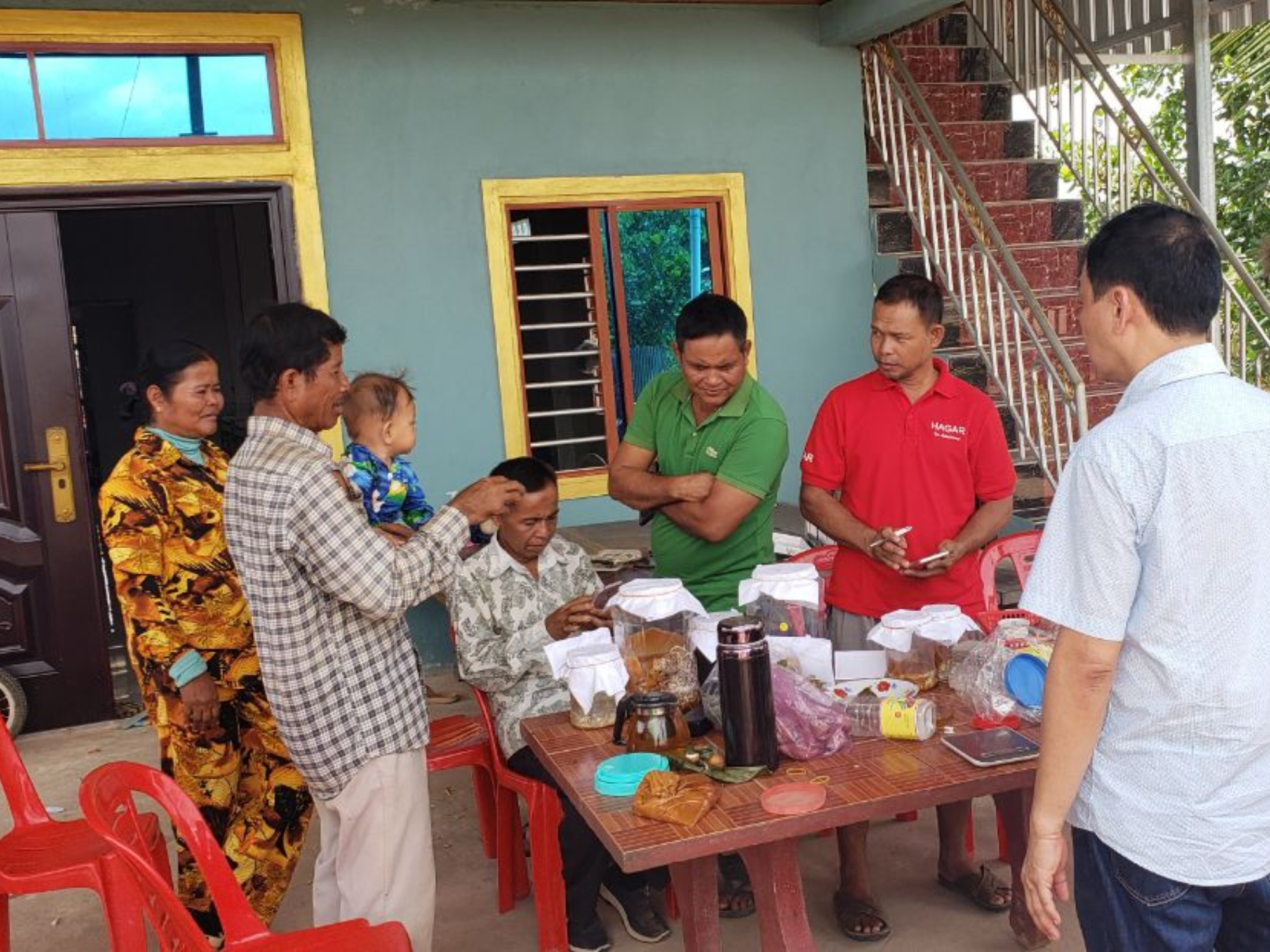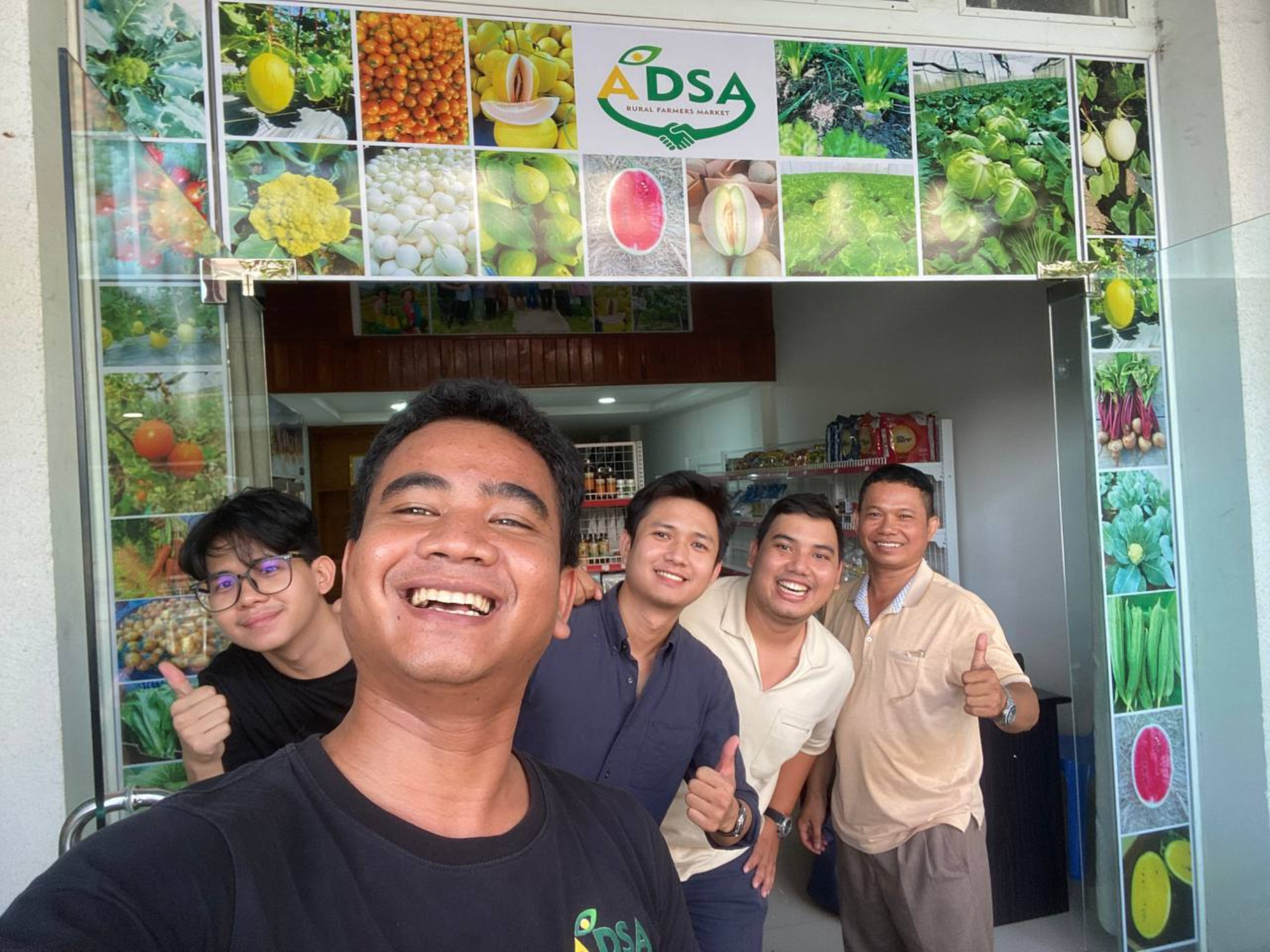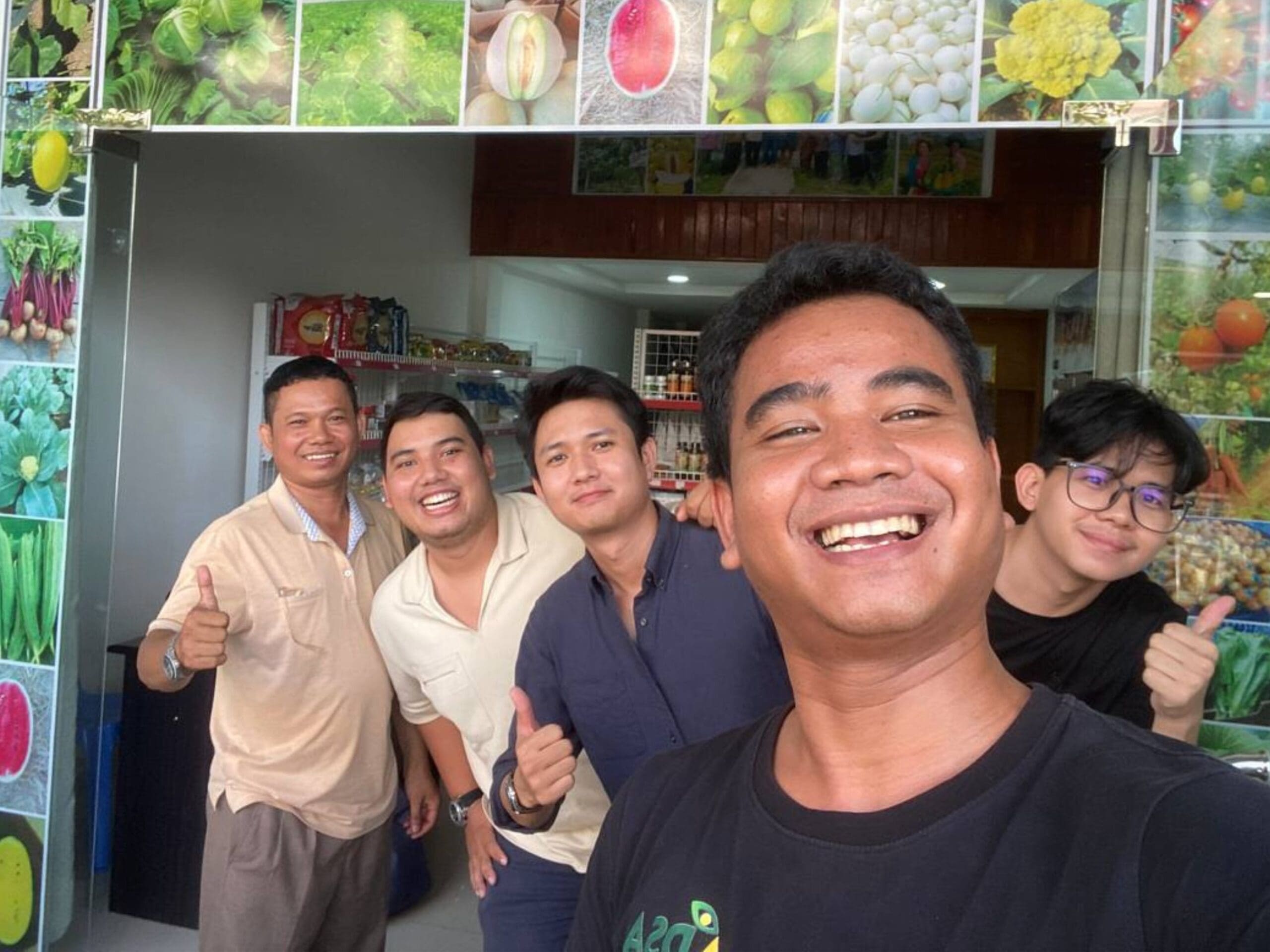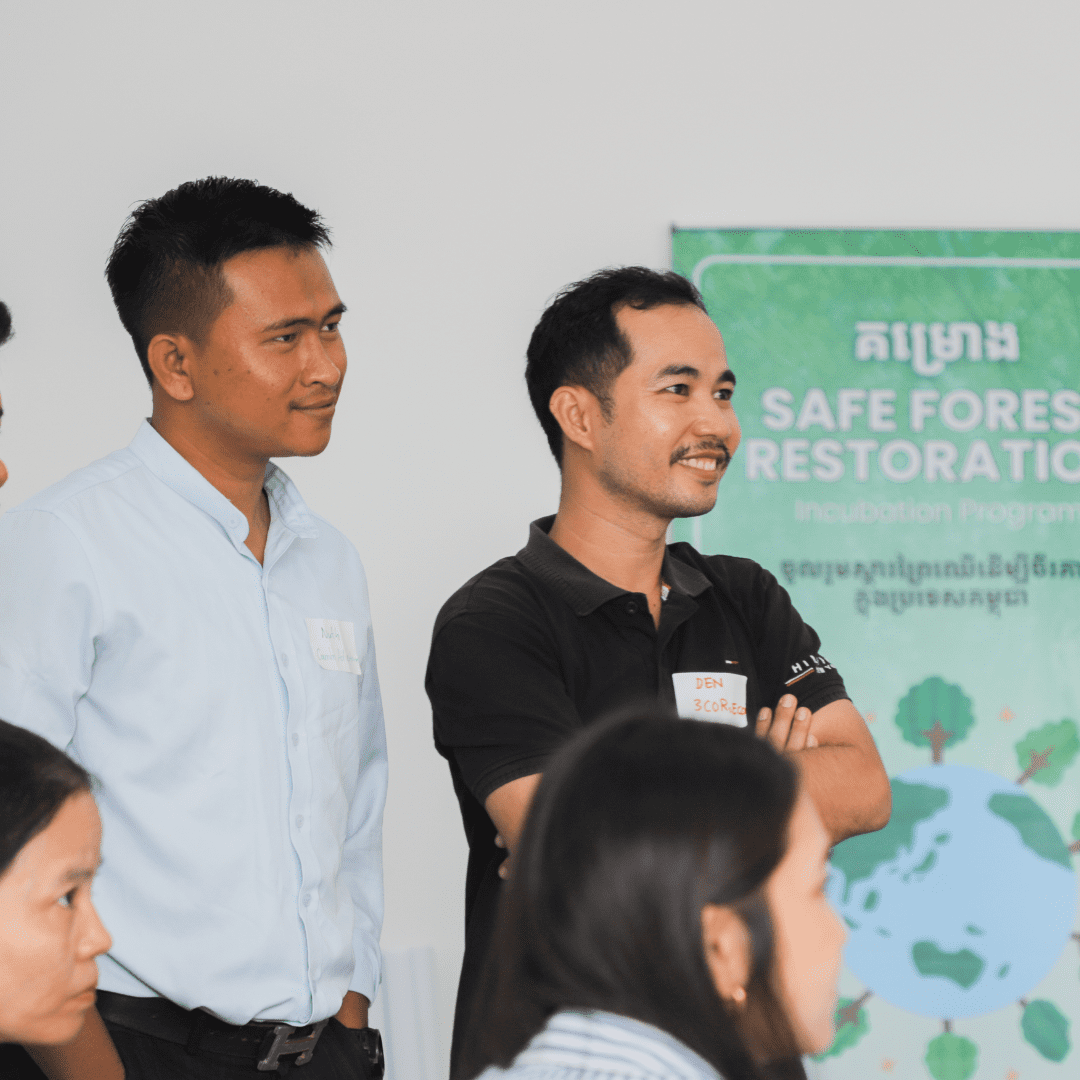Sprouting Digital Innovations in Cambodia’s Agriculture Sector
Through the first cohort of our SAAMBAT program, we’ve supported four startups who are piloting new digital agriculture solutions to transform Cambodia’s food systems.

- Annika Freudenberger
“Everything comes back to food and agriculture. The biggest challenges in my homeland, from migration to children missing school, trace back to the same core issue: the struggle of providing enough food for your family”, says Ek Manil, who grew up around farmers and worked on agriculture development as an adult. He saw first-hand how Cambodia’s farmers are struggling to do just that. It spurred him to quit his job and launch DamDoh, a startup leveraging technology to improve farmers’ agricultural practices – and, in turn, their livelihoods.
DamDoh is one of four pioneering ventures in Cambodia we’ve been working with over the past 18 months, part of the first cohort of the SAAMBAT Digital Agriculture Accelerator supported by the International Fund for Agricultural Development (IFAD) through the Sustainable Assets for Agriculture Markets, Business and Trade (SAAMBAT) project.

Bolstering Cambodia’s Rural Agriculture Sector through Digital Innovation
Over 40% of Cambodia’s population are rural farmers. Of these 6.8 million farmers, three-quarters are categorized as smallholder farmers. They are particularly vulnerable to the challenges faced by Cambodia’s agriculture sector, such as farm productivity and product quality, access to market, and the effects of climate change.
DamDoh’s Approach to Sustainable Farming and Household Food Security
Ek Manil of DamDoh saw a recurring pattern: smallholder farmers, seeking quick cash, would switch to farming cash crops (usually with chemical inputs). The result: rapidly degraded soil, accumulating debt when the produce didn’t sell, and inability to feed their own families. DamDoh’s app and farmer training are showing farmers how to establish diversified plots using Good Agricultural Practices to build their households’ food security — and then, to apply similar practices to improve the productivity and quality of their cash crops.
The social enterprise is still in its early days, but has already seen incredible results in adoption of Good Agricultural Practices and increased yields. One of DamDoh’s users had never grown a watermelon over 3kg. After following step-by-step guidance provided through the DamDoh app, he is producing watermelons of 10kg.
“We show farmers how just 200 square meters around their house, farmed well, can feed 10 people in their families with multiple types of vegetables, fish, and chicken,” shares DamDoh’s Manil. What he’s most proud of, he says, is that “Farmers were first only applying regenerative practices to their small subsistence plots. But upon seeing the positive results, they have begun adopting the same practices on all of their farmland.”
“Farmers were first only applying regenerative practices to their small subsistence plots. But upon seeing the positive results, they have begun adopting the same practices on all of their farmland.”
- Ek Manil, DamDoh
Connecting Farmers to Water: SOGE’s Driving Mission
Asking farmers to adopt a new technology is usually a major challenge. It’s why for SAAMBAT-supported startup SOGE, when farmers embrace (and recommend!) a new product, it’s a huge point of pride.
In just a few years, the company has become a pioneer of solar technology in Cambodia. They are best known for their solar pumps, which have brought reliable water to thousands of farmers who previously relied on diesel machines or manual labor to irrigate crops.
“When we talk to a farmer, their first reaction is usually ‘Technology doesn’t work,” says SOGE Project Coordinator Chhory Ouksa. “But from our experience setting up solar pumps, farmers eventually say ‘Wow, this is really helping us.” Building on these successes and learnings, SOGE decided to venture into a new complementary product with support from SAAMBAT: a smart irrigation system. Farmers can use their phones to irrigate their crops — setting a schedule, monitoring their water use, and controlling flow in real time.
“It’s tough to introduce a new technology, because it has to be perfect. If something doesn’t work when we test it with farmers, they immediately say they don’t like it,” Ouksa shares, slightly dispirited. But — she adds with more enthusiasm — her team has been able to invest heavily in research and development with support from SAAMBAT. They are testing the system with more and more farmers. Most importantly: “They love it, and show it to others!”

ADSA: Secure Livelihoods and Safe Produce for a Sustainable Agriculture Sector
The farmers that startup ADSA works with used to earn US$1,500 per year, on average. Today, they earn US$5,000 to US$10,000.
ADSA was founded to aggregate and distribute local safe and healthy agri-products, with a core mission of improving smallholder farmers’ access to markets. The company serves as a critical bridge. “Before, most of our partner farmers’ products were wasted because the quality wasn’t there. Buyers didn’t want it, and definitely wouldn’t pay a premium for it,” explains Hean Pheap, ADSA co-founder.
Farmers used so many chemical inputs that they sometimes wouldn’t even eat their own produce. That’s why the company, which recently launched its e-commerce platform, focuses on training farmers in Good Agricultural Practices, post-harvest, sorting, packaging, transportation, and more.
Not only that, but as a middleman wholesaler, ADSA assures a regular income for farmers. Pheap explains, “Big supermarkets or other middlemen often don’t pay suppliers for months. Plus, the price varies a lot. It can ruin a farmer.” ADSA guarantees a year-round stable price to farmers — often multiple times higher than the cut-rate prices a direct buyer would offer — and delivers payment immediately.
“Now, the farmers I work with are sending their kids to school for the first time. They used to have to sell their labor to someone else to supplement their income,” Pheap shares. At a larger scale, he’s proud to be safeguarding Cambodia’s agriculture sector. “So many people have stopped farming, because they think it’s a better business to sell sunglasses or soda. Through ADSA, I’m trying to professionalize and rebuild trust in the sector.”
CamScience’s Smart Irrigation Solution for Cambodian Farmers
Neak Sokkim comes from a family of farmers. She has no ambition to become a farmer herself — but has dedicated her career to addressing the hardships her family has faced. She’s a current university student in Phnom Penh, and the co-founder and CEO of CamScience: a startup developing a smart irrigation system for Cambodia’s smallholder farmers.
A typical farmer in rural Cambodia spends up to 6-7 hours a day on manual irrigation. Farmers who have tested CamScience’s IOT system have cut down that time by more than half. “For a farmer, saving time means saving money. Now, they can do other activities to generate more income,” reflects Sokkim. These time savings are particularly valuable for female farmers who tend to face additional multiple demands and burdens on their time.
She and her young team have only worked with a small number of farmers to date, but are already demonstrating impressive impact. “Crops grow better using our system because the farmer can better regulate the water quantity. The farmers we’ve worked with are so impressed because they see better crop yields and lower water use. It’s an amazing return on investment for them.”
“Now, the farmers I work with are sending their kids to school for the first time. They used to have to sell their labor to someone else to supplement their income."
- Hean Pheap, ADSA
Supporting the Innovators Behind the Innovations
“SAAMBAT provided our first-ever financing,” shares DamDoh’s Manil. “It was absolutely critical for us. It allowed us to improve our app, to do market research and testing with farmers, and to set up model farms to demonstrate to other farmers how our technology can make a real difference.” For SOGE, the SAAMBAT grant funding allowed the company to kickstart the development of a new product idea that they hadn’t been able to initiate to date.
The program also provided an enabling and encouraging environment. Over the course of the four-month program, Impact Hub offered tailored mentorship, masterclasses on business fundamentals, and access to new networks and visibility. Put more simply: “We finally had a place to ask dumb questions without judgment,” says ADSA’s Pheap with a laugh.
In any startup ecosystem, and especially the digital agriculture startup ecosystem in Cambodia, the challenges are numerous — but so are the positive impacts. “We’re proud that SAAMBAT is a launchpad for bold ideas transforming Cambodia’s agriculture sector,” said H.E. Dr. Taing Nguonly, Director of Techo Startup Center. “Cambodia has a proud agricultural heritage going back centuries. By strengthening resilience and innovation in the sector, we’re ensuring agriculture remains a thriving backbone of Cambodian life and economy for centuries more.”
The SAAMBAT accelerator is supported by the International Fund for Agricultural Development (IFAD) through the Sustainable Assets for Agriculture Markets, Business and Trade (SAAMBAT) project, a five-year project implemented by Cambodia’s Ministry of Rural Development as an executive agency and the Ministry of Economic and Finance as an implementing agency, financed by IFAD, European Investment Bank, and the European Union through Asia Investment Facility. SAAMBAT Digital Agriculture Accelerator is implemented by Techo Startup Center and organized by Impact Hub Phnom Penh.
Cover image courtesy of SOGE.
You also might like

“More valuable than helping with money”: How our hands-on support helped ADSA refocus their path
“More valuable than helping with money”: How our hands-on support helped ADSA refocus their path

Growing Green Businesses: How Entrepreneurs Are Helping Safeguard Cambodia’s Forests
Growing Green Businesses: How Entrepreneurs Are Helping Safeguard Cambodia’s Forests



